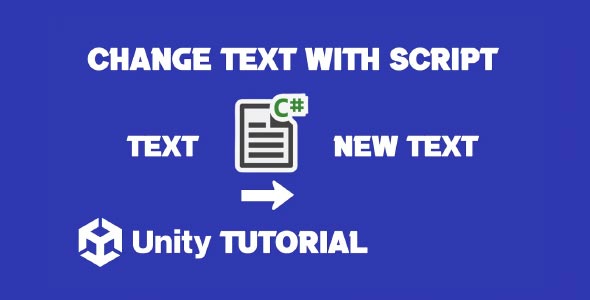Unity change text with script is a foundational concept every Unity developer should be familiar with, especially when building user interfaces or interactive gameplay elements. From updating scores to showing dynamic messages or dialogue, the ability to modify text dynamically is critical in any modern game. In this article, we’ll explore how and why you should control UI text in Unity using scripts, and provide a clear understanding of best practices to implement this behavior cleanly and efficiently.
Whether you’re working on a menu screen, dialogue system, or gameplay HUD, learning how to control text elements programmatically opens the door to a much more interactive experience. It also gives developers the flexibility to update UI content in real time, which is crucial for delivering a responsive game interface that feels alive.
Unity Modify Text From Script
The core idea behind a Unity modify text from script approach is to allow the game to react to events by changing the content displayed to the player. This could be a changing score counter, a warning message, or a response to a player’s interaction. With Unity’s UI system, especially using the Text or TextMeshPro components, you can easily manage these updates from within your code logic.
For example, think about a role-playing game where you want the name of the quest to appear when a player picks it up. This is where you would modify text in Unity, allowing your UI to reflect what’s happening in the game world without manually updating every instance in the editor. This saves development time and ensures consistency across the user interface.
When you rely on scripted text changes, it also enhances localization, as dynamic text replacement enables support for multiple languages. A single text element can be updated based on the player’s selected language, without needing to create separate UI components for each translation.
Unity Edit Text With Script
To Unity edit text with script effectively, it’s important to understand how the UI components are structured. Your text elements are usually attached to GameObjects that live in the canvas of your scene. Being able to identify and reference these objects from a script allows your game to change text based on logic, timing, or user interaction.
For instance, if a player completes an objective, you can display “Mission Complete” without needing to prepare separate scenes or UI layers. This approach makes your user interface more scalable and reduces the manual effort involved in managing static text elements.
The ability to edit text from script is especially useful in situations where the content is dynamic, such as displaying the number of items collected, showing the player’s name, or reflecting the choices they made during a dialogue tree. With a flexible scripting setup, you can create more immersive and responsive game experiences that adjust to the player’s actions in real time.
Benefits Of Dynamic Text In Unity
Being able to Unity change text with script provides several benefits that go beyond simple convenience. Firstly, it greatly improves workflow efficiency. Instead of hardcoding values or manually updating UI fields during development, scripted text updates allow you to automate many elements of your user interface.
Secondly, it enhances the player’s experience. When UI elements react immediately to player actions—like displaying “Level Up!” after gaining experience—the feedback loop feels instantaneous and satisfying. This type of immediate feedback contributes to a more polished and engaging game.
Another benefit is reusability. Once you’ve structured your UI to support dynamic updates, you can reuse the same components across different game levels or scenes. There’s no need to build unique UI setups for each scenario—just change the text through script based on the context.
Modify Text With Script Unity In Real-Time Interfaces
A common use case for Unity modify text from script is in real-time interfaces such as health bars, timers, or score counters. These elements must update quickly and frequently to reflect what’s happening in the game. Hardcoding them in the editor would not only be impractical but also impossible during live gameplay.
Instead, these components are updated via game logic that listens to changes in variables or game states. For example, each time an enemy is defeated, the score might increase, and the UI will reflect that change. This creates a seamless integration between gameplay and interface, keeping players informed without breaking immersion.
It also makes debugging easier. When you control text updates through script, you can log the same variables to the console and match them with the visual output. This is especially helpful during testing and refining gameplay systems.
Edit Text For Narrative Games
For narrative-driven games, the ability to Unity edit text with script is essential. Dialogue systems rely heavily on updating text based on branching choices, character interactions, and scene progression. With scripted control, you can update not just dialogue content but also character names, subtitles, and on-screen instructions.
Games with tutorials also benefit from this functionality. As the player progresses through lessons or stages, the instructional text can evolve based on their current level of understanding. Whether it’s updating a tooltip or providing contextual hints, changing text via script enhances communication between the game and the player.
Moreover, by linking text updates to events such as button presses or triggers, your game becomes more dynamic. This interactivity forms the backbone of many engaging storytelling mechanics and player-driven experiences.
Structuring Your UI For Flexibility
When implementing change text mechanic, structure your UI so that all important text fields are easy to access and update. Use clear naming conventions, group related elements in the hierarchy, and avoid hard dependencies between scripts and UI components. This makes it easier to scale your interface as your game grows in complexity.
Using modular design principles, you can create reusable UI managers that handle all text updates in one place. This centralization improves maintainability and makes it easier to add new features later without breaking existing functionality.
Also, ensure your UI is responsive across different screen resolutions and devices. When you dynamically change text, especially longer strings, make sure your layout adjusts gracefully. Using flexible containers and auto-sizing options in Unity’s UI tools can help prevent overflow and truncation issues.
Conclusion
To summarize, learning how to Unity change text with script is a vital step in building responsive, immersive, and efficient user interfaces in Unity. From gameplay feedback to narrative interaction, the ability to modify text on demand allows developers to create dynamic experiences that adapt to the player’s actions and decisions.
The ability to Unity modify text from script provides a bridge between your game logic and user interface. Whether it’s showing scores, names, instructions, or mission objectives, this approach keeps the game world and player feedback in sync, which is essential for player satisfaction.
Finally, when you Unity edit text with script, you’re enabling your UI to respond intelligently to the evolving state of your game. Whether you’re updating live stats or driving complex dialogue systems, dynamic text manipulation is one of the most powerful tools for modern game development. Embracing it will give your projects the polish and flexibility that today’s players expect.
Legacy Script
using UnityEngine;
using UnityEngine.UI; // Include this to access the UI components
public class TextUpdater : MonoBehaviour
{
public Text textComponent; // Reference to the Text component
void Start()
{
// Ensure the Text component is assigned in the Inspector
if (textComponent != null)
{
textComponent.text = "Hello, World!"; // Change the text
}
}
// Method to update text dynamically
public void UpdateText(string newText)
{
if (textComponent != null)
{
textComponent.text = newText;
}
}
}TMPro Script:
using UnityEngine;
using TMPro; // Include this to access TextMeshPro components
public class TextMeshUpdater : MonoBehaviour
{
public TMP_Text textMeshProComponent; // Reference to the TextMeshPro component
void Start()
{
// Ensure the TextMeshPro component is assigned in the Inspector
if (textMeshProComponent != null)
{
textMeshProComponent.text = "Hello, World!"; // Change the text
}
}
// Method to update text dynamically
public void UpdateText(string newText)
{
if (textMeshProComponent != null)
{
textMeshProComponent.text = newText;
}
}
}In Unity, changing UI text through scripts is a common task when building dynamic interfaces, such as score displays or dialogue systems. Once you’re familiar with modifying the text itself, you might also want to look into Unity Change Text Color Script to control how your UI visually responds to game states.



